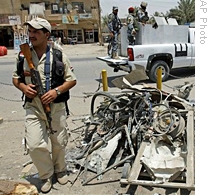Cairo
09 July 2009
 |
| Iraqi security forces secure the site of a bomb concealed in a bicycle parked at a market in Baghdad, 09 Jul 2009 |
It was a bloody day in Iraq, Thursday, recalling some of the worst bombings of recent years, with dozens of casualties in in explosions in Baghdad and the northwestern border town of Tal Afar.
Witnesses say two suicide bombers blew themselves up, minutes apart, in the northwestern town of Tal Afar, near the Syrian border. The second explosion appeared to target civilians who had gathered to help victims of the first bombing.
Tal Afar is home to a large population of ethnic Turkmens, whose relations with Iraq's sunni Arabs, in both neighboring Kirkuk and Mosul, have been strained in recent years.
 |
| Police and civilians stand at the scene of a car bombing near Mosul, northwest of Baghdad, Iraq, 09 Jul 2009 |
A heavy-set man, spattered with blood, explained that he had just "married off his son," when events abruptly took a turn for the worse.
He says that he and others were at the wedding party, when a suicide bomber blew himself up among the guests.
Meanwhile, there was a bombing in a vegetable market in Baghdad's mainly Shi'ite district of Sadr City, with dozens of casualties.
Yet another explosion, this time a roadside bombing, went off in Baghdad's Karrada district, apparently aimed at the convoy of Iraq's central bank governor. The governor was unhurt, by the blast.
All three top Iraqi government security spokesman indicated, last week, that they thought the Iraqi government now had security matters "under control."
Prime Minister Nouri al-Maliki urged Iraqi citizens, recently, to cooperate with the country's security forces to put a stop to terror attacks. Efforts at reconciliation between Iraq's rival Shi'ite and Sunni factions have continued since local elections last January.
Member of parliament Hanin Qudwa told journalists that he thought that those who were behind the recent explosions were trying to affect the political process.
He says that those who are behind the explosions, either on behalf of foreign parties or local parties, are undoubtedly trying to influence the political process, and probably the upcoming parliamentary elections.
The recent rash of bombings comes close to ten days after U.S. troops withdrew from Iraqi cities and towns, according to a security pact signed last November with the Iraqi government.
Meanwhile Iranian state media say U.S. forces in Iraq have released five Iranian diplomats who were detained in 2007 on suspicion of helping Shi'ite Iraqi militants. U.S. forces had detained the diplomats in the northern town of Irbil.